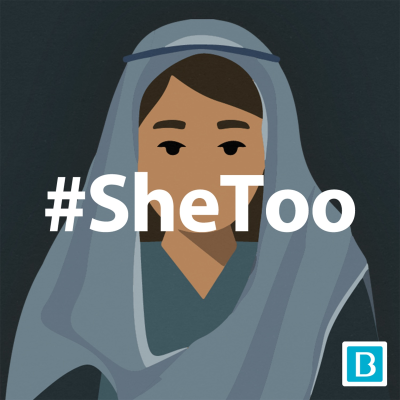
Bible Society #SheToo
Podcast von Bible Society #SheToo
Nimm diesen Podcast mit

Mehr als 1 Million Hörer*innen
Du wirst Podimo lieben und damit bist du nicht allein
Mit 4,7 Sternen im App Store bewertet
Alle Folgen
7 FolgenWe’ve heard some strong stuff. Perhaps you knew these stories already but had you heard them preached about in Church? Is it really appropriate to do so? Rev Dr Helen Paynter thinks it is. In this final podcast she talks to Rosie Dawson about the need for Christians to find the resources in the Bible that can help them in their quest for sexual justice.
This passage contains not a story about sexual violence, but a metaphor of it. The writer of Revelation uses the imagery of sexual violence to speak of the punishment that awaits the prophetess Jezebel who is accused of leading the church into idolatry. Dr Meredith Warren tells Rosie Dawson why she believes the language used in this passage is damaging for the one in four women in churches who have suffered sexual abuse.
In a world which – then as now – frequently divides women into Madonnas or whores, Tamar is the ‘perfect’ rape victim; virginal, beautiful, obedient. Her rape takes place within the Royal Household of King David. Tamar, David’s daughter, is raped by her half-brother Amnon. For the writer the rape is set in the larger context of the falling apart of the Royal family. Dr Johanna Stiebert wants to attend to the voice of Tamar as she resists her abuse and expresses its devastating consequences for her.
The story of the Levite’s concubine is brutal beyond words. The victim has no name and does not get to speak. She is betrayed by her husband and handed over to a mob to be raped and murdered. War and the trafficking and rape of many more women follows. What place has such a terrible story in the Bible? Dr Mary Evans believes that the narrator, intending his original readers to be as shocked as we are, wants to demonstrate what happens when a nation ignores God.
The story of Jephthah’s daughter is the tragic tale of rash promises and unintended consequences. The warrior Jephthah makes a vow to sacrifice the first person to come out of his house to greet him if the Lord gives him victory over the Ammonites. It doesn’t occur to him that that person might be his only child, his daughter. Rabbi Shoshana Boyd Gelfand finds plenty to weep about in this story – but she also finds a story of female empowerment.























